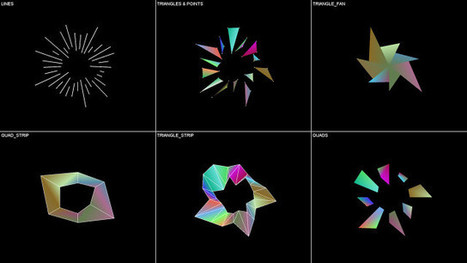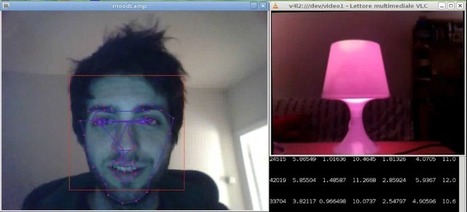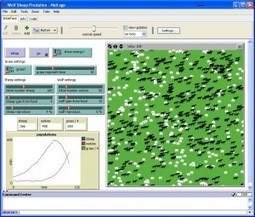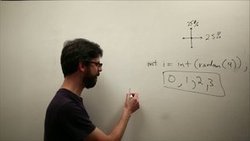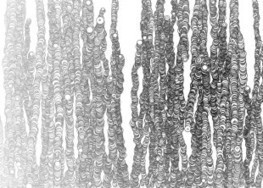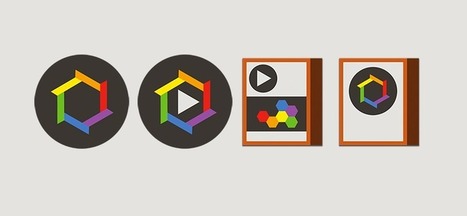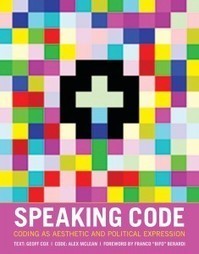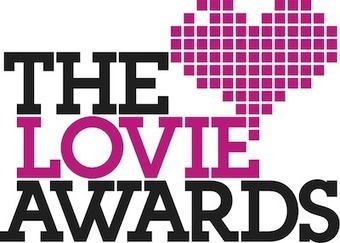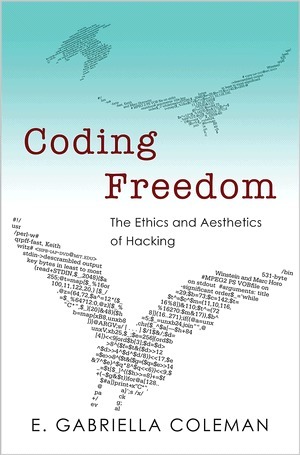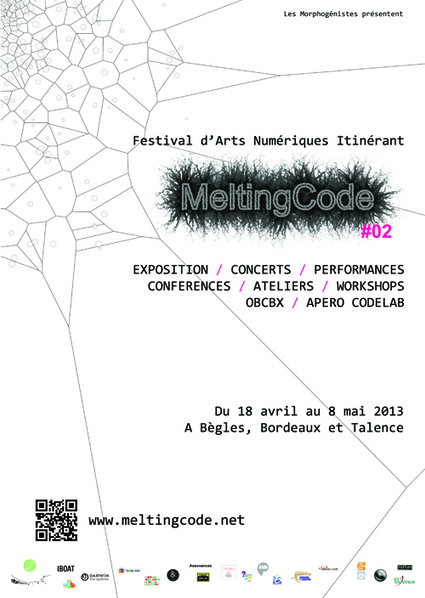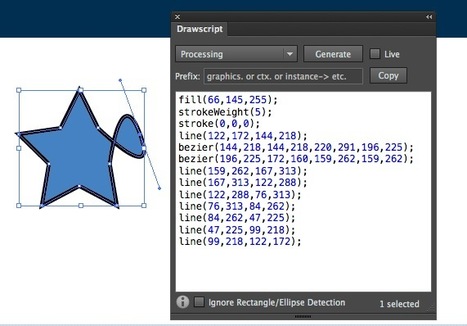 Your new post is loading...
 Your new post is loading...

|
Scooped by
Jacques Urbanska
June 9, 2013 12:26 PM
|
As the title suggests, I’ll be covering a lot of ground in this blog post. My intention is to describe and show practical examples of a number of crucial building blocks for 2D/3D projects. In that sense the tutorial is more a general reference, rather than a step-by-step towards a singular end-result. All of the shared code examples are fully commented, so reading them will tell you what each line of code does. This makes it easier to understand and adapt sketches yourself. In this tutorial I’ll start with the basics, creating custom geometry in two dimensions. Then we’ll look at adding textures to these 2D shapes. Not only is this useful in itself (for 2D visuals), but the concept of texturing is also easier to grasp in 2D. Texturing can be used for a variety of things, not just placing static images onto geometry. One of the examples shows you how to use dynamic texturing and spritesheets to create 2D animations! Once we’ve covered 2D, we’re ready to make the move to 3D. Starting with flying multi-colored pyramids, then creating an earth with vertices, normals, textures and correct texture coordinates. Especially the latter – getting the texture coordinates right – can be quite a challenge. ...

|
Scooped by
Jacques Urbanska
May 19, 2013 12:43 PM
|
Planet Arduino is, or at the moment is wishing to become, an aggregation of public weblogs from around the world written by people who develop, play, think on Arduino platform and his son. The opinions expressed in those weblogs and hence this aggregation are those of the original authors. Entries on this page are owned by their authors. We do not edit, endorse or vouch for the contents of individual posts.

|
Scooped by
Jacques Urbanska
May 17, 2013 9:51 AM
|
C’est la lecture de « Programmer ou être programmé » de Douglas Rushkoff qui m’a donné envie d’écrire cette chronique. Le titre est fort, il fait même peur. Comment initier le public à la programmation alors qu’elle semble complexe et presque hors de portée pour la plupart des gens ? Encore plus quand la majorité des utilisateurs du Net n’en voit pas l’utilité ! Faites le test en demandant autour de vous comment faire un lien hypertexte…
Les nostalgiques se souviennent d’HyperCard, le logiciel de programmation proposé dès 1987 par Apple. A l’heure du Web des services en ligne où taper une ligne de code n’est plus nécessaire pour accéder à des données (et les modifier), et que le mot geek est devenu synonyme d’un mec ou d’une fille qui s’habillent « trop cool », Poptronics se devait de réagir !!!

|
Scooped by
Jacques Urbanska
May 10, 2013 9:44 AM
|
CMSday, le premier événement français et européen consacré à la gestion de contenu open source. La rencontre du meilleur des CMS open source. Le 25 juin 2013 à Paris Le CMSday a rencontré un réel succès lors de sa 1ère édition en 2012. Près de 600 participants étaient présents pour une journée riche de conférences, de tables rondes et de rencontres. L'événement sera cette année encore marqué par de nombreux temps forts, avec des prises de parole d'experts, des conférences et des tables rondes.

|
Scooped by
Jacques Urbanska
May 8, 2013 9:51 AM
|
Si l’informatique “à la papa”, celle des bons vieux programmes COBOL qui automatisaient les fiches de paie, semble dominée par le paradigme du contrôle, de l’absence de créativité ou de l’ambiguïté, cela fait bien longtemps maintenant que les informaticiens ont compris que le caractère rigoureux de la programmation informatique n’interdit pas pour autant la surprise ! De fait, l’ordinateur est depuis bien longtemps l’outil favori des explorateurs de la complexité. Mais d’abord, la complexité qu’est-ce que c’est ? Difficile à dire, car il en existe plusieurs définitions, chacune liée à une théorie particulière. Si par exemple vous référez au chaos, vous définirez la complexité comme la sensibilité extrême aux conditions initiales : autrement dit, pour employer la fameuse expression, c’est ce battement d’ailes de papillon à Melbourne qui finit par déclencher un ouragan à Montréal. D’autres – en s’inspirant des mathématiques fractales – vous diront que la complexité est produite au sein de systèmes autosimilaires (composés de versions d’eux-mêmes). Les adeptes de la théorie des réseaux vous parleront des petits mondes, de l’importance des liens “faibles”, de la connectivité d’un système, etc. ...

|
Scooped by
Jacques Urbanska
April 24, 2013 9:07 AM
|
An intro to a new video series to supplement natureofcode.com How can we capture the unpredictable evolutionary and emergent properties of nature in software? How can understanding the mathematical principles behind our physical world help us to create digital worlds? This book focuses on the programming strategies and techniques behind computer simulations of natural systems using Processing.

|
Scooped by
Jacques Urbanska
April 23, 2013 8:35 PM
|
Medialab-Prado's digital facade opens up to programmers from all over the world. Write and submit your interative sketches based on the visual programming language Processing.js. A project by Uncoded collective

|
Scooped by
Jacques Urbanska
April 5, 2013 4:11 PM
|
A full weekend of music hacking. Software + hardware + art + web. Come build the future of music. April 20th-21st, 2013 Music Hack Day is an international 24-hour event where programmers, designers and artists come together to conceptualize, build and demo the future of music. Software, hardware, mobile, web, instruments, art - anything goes as long as it’s music related.

|
Scooped by
Jacques Urbanska
April 3, 2013 11:41 AM
|
Le site français des tutos sur processing

|
Scooped by
Jacques Urbanska
March 28, 2013 4:40 PM
|
Polycode is completely free and open source (MIT license), with all development happening publicly on Github. Its core is written in C++ and currently runs on Mac, Windows and Linux with iOS and Android support planned in the future.

|
Scooped by
Jacques Urbanska
March 5, 2013 7:16 AM
|
“Speaking Code beautifully folds speech and language, politics, art, and labor into an inspiring analysis. In addition to their clarity in style, Geoff Cox and Alex McLean are not afraid to get their hands dirty with references to the ugly sides of software and unsanitized code, which are too often hidden under the polished covers of contemporary design of digital culture.” – Jussi Parikka, author of Digital Contagions, Insect Media, and What Is Media Archaeology?; Reader in Media & Design at Winchester School of Art, UK “Speaking Code incisively analyzes the forms, expression and action of computer code. In contrast to much loose and diffuse discussion of software, Speaking Code directly engages with code as utterance. Its careful exploration of code-making and code use opens onto much wider issues of power, agency and value. Theoretically nuanced and technically informed, in the precision with which it treats its materials this book really made me sit up and take notice of code.” – Adrian Mackenzie, Sociology, Lancaster University, UK

|
Scooped by
Jacques Urbanska
March 3, 2013 10:11 AM
|
Before drawing anything in a browser, ask yourself three questions: Do you need to support older browsers? If the answer is yes, then your only choice is Raphaël. It handles browsers all the way back to IE 7 and Firefox 3. Raphaël even has some support for IE 6, although some of its underlying technology cannot be implemented there.Do you need to support Android? Android doesn’t support SVG, so you’ll have to use Paper.js or Processing.js. Some rumors say that Android 4 will handle SVG, but the majority of Android devices won’t support it for years.Is your drawing interactive? Raphaël and Paper.js focus on interaction with drawn elements through clicking, dragging and touch. Processing.js doesn’t support any object-level events, so responding to user gestures is very difficult. Processing.js can draw a cool animation on your home page, but the other tools are better for interactive applications.

|
Scooped by
Jacques Urbanska
February 25, 2013 8:10 AM
|
Hello World! is a documentary series on three programming languages -Processing, Open Frameworks y Pure data- that have increased the role of coding in the practice of artists, designers and creators around the world. The series explores the creative possibilities expanded by these open source tools and the importance of their growing online communities.
Hello World! est une série de documentaires dédiée à trois langages de programmation -Processing, Open Frameworks et Pure data- qui ont permis aux artistes, designers, et créateurs du monde entier de se familiariser avec la programmation. Grâce à leur communautés d’utilisateurs, ces outils libres ont ouvert de nouvelles possibilités de travail et de création. C’est ce que cette série de documentaire cherche à explorer et à montrer.
|

|
Scooped by
Jacques Urbanska
May 25, 2013 9:16 AM
|
Tutorial how to output algorithmically created graphical ornaments or representations of data in Processing to multiple page documents, ready for offset print with process (CMYK) and spot colors. Last month at Resonate festival in Belgrade Andreas Gysin ran a workshop titled “Printshop With Processing” aimed at graphic designers who want to integrate Processing in their print-production workflow. The participants discussed and experimented with different ways on how to output algorithmically created graphical ornaments or representations of data to multiple page documents, ready for offset print with process (CMYK) and spot colors. Using this tutorial and examples, previously edited vector graphics, typography blocks or entire layouts in PDF documents can be imported, manipulated and used as templates instead of adding them later-on ‘by hand’. ...

|
Scooped by
Jacques Urbanska
May 17, 2013 10:52 AM
|
-The Boston Cyberarts Gallery is pleased to present Poetic Codings, straight from its premiere exhibition at the Fellows of Contemporary Art gallery in Los Angeles. The exhibition includes three projections by John Carpenter, Casey Reas and Jeremy Rotsztain as well as 20 original, interactive iPad artworks by 8 artists including John Baldessari, Jason Lewis, Lia, Erik Loyer, Jeremy Rotsztain, Rafaël Rozendaal, Scott Snibbe and Jody Zellen. This exhibition includes computer projections by three of the finest new media artists on the West Coast. In the wonderfully interactive Dandelion Clock by John Carpenter, the viewer’s proximity blows the seeds of a digitally created dandelion about the wall. Jeremy Rotsztain’s Action Painting is a video projection transferred onto a large canvas in the style of Jackson Pollock. It is composed using data from action movies as material. Casey Reas, one of the inventors of Processing (a computer language for artists), presents Signal to Noise (Software 1), which uses television signals as a raw material distorting contemporary information into new abstract data structures. ...

|
Scooped by
Jacques Urbanska
May 14, 2013 11:12 AM
|
This book is has been commissionned by PACKT PUBLISHING to Julien Bayle, author and digital artist. You can read one of the official first post about the book here.You can read an official interview by Arduino Blog here
“C Programming for Arduino will open new fields of knowledge by looking at input and output concept, communication and networking, sound synthesis and reactive systems design. Readers will learn the necessary skills to be able to continue their travel by looking at the modern world differently, not only as a user, but also as a real maker” – Julien Bayle

|
Scooped by
Jacques Urbanska
May 12, 2013 1:01 PM
|
You've seen these bizarre images made of text characters. Most of them are inane and amateurish, but some ASII art is absolutely stunning and complex. What exactly is this bizarre art form? And how do people make ASCII art? Creating and displaying ASCII text art is not difficult. With a few minutes of practice and experimentation, and using CTRL-C / CTRL-V to copy-paste, you should be a beginning ASCII artist within 30 minuntes! Question: What Is 'ASCII Text Art'? How Do I Make ASCII Art?
Answer: 'ASCII art' is also known as computer text art. It involves the clever placement of typed characters to form a visual shape spread over multiple lines of text. You will see these ASCII text art pictures in email signatures, online discussion forums, and online game chat. ...

|
Scooped by
Jacques Urbanska
May 8, 2013 9:48 AM
|
Pour le créateur de l’informatique, Alan Turing, l’intelligence artificielle triompherait lorsqu’un programme informatique réussirait à convaincre un interlocuteur qu’il était humain. C’est le fameux “test de Turing” qu’aucune machine n’a réussi à passer depuis – même si plusieurs “agents conversationnels” s’en sont approchés. C’est dire si la reconnaissance et la pratique du “langage naturel” sont une discipline clé de l’intelligence artificielle. Mais c’est aussi une de celle qui avance avec le plus de difficultés. Pourtant, ces derniers mois ont été riches en avancées qui laisseraient à penser que le problème serait en phase de résolution. Stephen Wolfram à créé un « moteur de connaissances » interrogeable en langage naturel, WolframAlpha. Apple a beaucoup communiqué sur son assistant personnel Siri (même si les avis des consommateurs sur son efficacité restent assez partagés). Et pour la première fois un ordinateur s’est révélé meilleur que des humains au Jeopardy (un jeu qui n’a pas la noblesse des échecs, mais qui présuppose de la part du joueur une compréhension correcte du langage, non seulement en terme de syntaxe et de vocabulaire, mais surtout la capacité de comprendre le contexte d’un indice, bref, le sens des mots). ...

|
Scooped by
Jacques Urbanska
April 24, 2013 8:52 AM
|
Successfully launched in 2011, this year the AppArtAward competition is already being held for the third time! In 2013, as in past years, the ZKM | Center for Art and Media Karlsruhe, the CyberForum and their partners are again looking for the best artworks in app-format - advanced artistic applications. Apart from aesthetic aspects, the focus is on creative integration and use of technological capabilities. At the award presentation ceremony on July 12, 2013, the generous prizes will be presented to the winners. Afterwards, the winning apps, plus a selection of the best entries, will be on show at the ZKM where visitors are invited to test them.

|
Scooped by
Jacques Urbanska
April 18, 2013 7:24 AM
|
The Lovie Awards is the only pan European Award to honour the entire breadth of content created for the internet. The Lovie Awards is open to entries in English, French, Spanish, Italian and German. The Lovie Awards honours the best in Websites, Online Advertising, Internet Video, Mobile & Apps and now Social.

|
Scooped by
Jacques Urbanska
April 3, 2013 12:26 PM
|
Who are computer hackers? What is free software? And what does the emergence of a community dedicated to the production of free and open source software--and to hacking as a technical, aesthetic, and moral project--reveal about the values of contemporary liberalism? Exploring the rise and political significance of the free and open source software (F/OSS) movement in the United States and Europe, Coding Freedom details the ethics behind hackers' devotion to F/OSS, the social codes that guide its production, and the political struggles through which hackers question the scope and direction of copyright and patent law. In telling the story of the F/OSS movement, the book unfolds a broader narrative involving computing, the politics of access, and intellectual property. E. Gabriella Coleman tracks the ways in which hackers collaborate and examines passionate manifestos, hacker humor, free software project governance, and festive hacker conferences. Looking at the ways that hackers sustain their productive freedom, Coleman shows that these activists, driven by a commitment to their work, reformulate key ideals including free speech, transparency, and meritocracy, and refuse restrictive intellectual protections. Coleman demonstrates how hacking, so often marginalized or misunderstood, sheds light on the continuing relevance of liberalism in online collaboration.

|
Scooped by
Jacques Urbanska
April 3, 2013 10:34 AM
|
Site du Festival MeltingCode organisé par l'association Les Morphogénistes dans le but de promouvoir la culture des Arts Numériques et les médiums qui en composent son essence. MeltingCode est un festival dont le but est de faire découvrir la culture électronique et numérique, ou le mélange des Arts, de la Science et des Technologies.
De plus en plus présentes dans les formes actuelles du spectacle vivant, les technologies numériques nous font rêver et parfois nous intriguent. Mais comment sont-elles réellement utilisées ? Par qui, et dans quel but ? MeltingCode se propose de décoder ces pratiques mêlant temps-réel, hacking, électronique et langages de programmation, afin d'offrir au public une vision décryptée de l'univers des Arts Numériques.
Une série de conférences, de workshops, de concerts, de performances live et d'expositions aura lieu tout au long du festival, proposant ainsi différents axes de lecture à travers la médiation culturelle, la vulgarisation technique, la pédagogie, et la création. Un des buts assumés de l'évènement est de favoriser une dynamique locale en impliquant au maximum les principaux acteurs de la création numérique dans la CUB, tout en l'ouvrant au niveau national, voire international.

|
Scooped by
Jacques Urbanska
March 23, 2013 9:44 AM
|
Drawscript is an extension for (a tool from Adobe® Creative Cloud)It generates graphics code from vector shapes in realtime.Obj-CC++JavaScriptProcessingActionScript 3JSONRaw Bezier Points

|
Scooped by
Jacques Urbanska
March 3, 2013 10:35 AM
|

|
Scooped by
Jacques Urbanska
February 27, 2013 4:43 AM
|
Generative art is created with the use of an autonomous system, usually a computational process fashioned by the artist. Many methods used by generative artists such as Golan Levin, Casey Reas, and Scott Draves are, at their origins, simulations of complex systems which exhibit emergent behavior. The natural world is full of such systems. Computational physics is the study of converting the often impenetrable mathematics of real physics into a virtual, computer-friendly form. In other words, it lets us turn differential equations into ordered streams of simple operations: addition, multiplication, and the occasional square root. Artist, scientist, and programmer Mark J. Stock will introduce Processing, a self-contained programming and execution environment, and walk through a deceptively simple algorithm that can be easily modified to produce flocking, galactic collisions, and fluid turbulence. An open programming session will follow the presentation, giving you an opportunity for guided exploration, discussion of advanced topics, collaboration, or simply exercising your creativity. If you wish to follow along, bring a laptop with Processing installed...
|



 Your new post is loading...
Your new post is loading...

